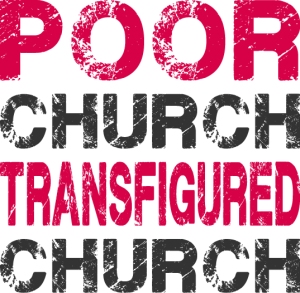How can we listen better?
 Church Action on Poverty in Sheffield share a report on their service for Church Action on Poverty Sunday 2017 – with a powerful sermon by the Director of the Urban Theological Union.
Church Action on Poverty in Sheffield share a report on their service for Church Action on Poverty Sunday 2017 – with a powerful sermon by the Director of the Urban Theological Union.
St Marie’s Roman Catholic Cathedral hosted our service on 26 February this year. We were welcomed by the Dean, Fr Chris Posluszny, and by our chair, Nick Waterfield, and the service was led by Fr Shaun Smith. The preacher this year was the new Director of the Urban Theology Union, Revd Keith Hebden.
Thanks are due to Briony Broome, who led the intercessions, to David Price, who played the piano, and to Maryke Turvey, who read the gospel. Here we share the text of the challenging address which Keith Hebden gave following the reading of the story of the Transfiguration:
The story of Jesus’ transfiguration underlines and highlights for us the vitality of the legends of Moses and Elijah for Jesus’ disciples. They lived and breathed the heroes of the Bible, and looked for signs that God might do again what God did through these giants of faith. This is why we see glimpses of both in the Gospels, allusions that sometimes are so subtle that they might pass us by completely.
We could hardly say that about the story of the Transfiguration in Matthew’s gospel. Like Moses, Jesus climbs a mountain to receive God’s word; instead of Aaron, he takes with him two of his disciples. The presence of God is revealed to Jesus, just as it was to Moses, and instead of a brightly shining face like Moses experienced in the tent of God’s presence, Jesus glows with God’s glory from head to foot.
The place where tradition tells us this event took place is Mount Hebron. Mount Hebron is now home to a religious community that takes care of people who are on the margins of society and helps them heal through faith and by tending the beautiful grounds. It seems appropriate that Mount Hebron is still a place of transfiguration.
This year our theme is the transfiguration of the Church into a Church of ‘the Poor’ instead of for them. It makes the vital point that it is not enough for the Church to be alongside but ‘other’ than those who are struggling the most.
The phrase ‘the poor’ is all over the Old Testament, and was picked up and brought to our attention by Liberation theologians in Latin America. Both of those contexts have a greater sense of the collective than ours, and the term was a self-chosen one, in the latter at least.
But this presents us in the UK with a problem. In her research into poverty in Britain, Ruth Lister has discovered over and again that ‘poor’ is not a term that people use here to self-describe. There is not agency in this word. It is something that is used to describe someone else. The power of many words in liberation theology is in their self-description. The so-called-untouchables rejected Gandhi’s ‘harijan’ and chose ‘dalit’. Terms like ‘Black’, ‘Gay’, ‘Queer’ are all terms that are chosen as sounds of protest and self-agency. In the UK this is not true of the phrase ‘the poor’.
If the Church is to be transfigured as a Church of the poor then it needs to ditch that term altogether. “What term shall we use?” is not yet the question. How can we listen in a way that invites self-agency from those we mean? That is the question.

The word I use is ‘invisible’.
After a series of horrific experiences over some months in a church I tried for years, from one end of the church to the other, to get someone to follow the procedures laid down in the Diocesan policy against bullying. To this day, 5 years later. that has not happened.
It took 3 years to get a verbal apology from a bishop, but still nothing changed.
In relation to income, health, the church and society I am invisible. My voice is unheard, my opinions ignored, my concerns disregarded. The church protects itself from change, and from people such as myself.
The end result is profound disillusion and a realisation that there is nowhere in my own communion where I can be safe, because the policies which are designed to keep me, and others like me, safe, might as well be made of candy floss.
Behold; the poor are here, they are with us. And they are ignored and invisible.